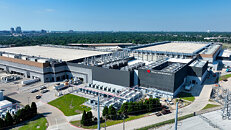Texas Instruments to Invest More Than $60 Billion Across Seven U.S. Semiconductor Fabs
Texas Instruments (TI) today announced its plans to invest more than $60 billion across seven U.S. semiconductor fabs, making this the largest investment in foundational semiconductor manufacturing in U.S. history. Working with the Trump administration and building on the company's nearly 100-year legacy, TI is expanding its U.S. manufacturing capacity to supply the growing need for semiconductors that will advance critical innovations from vehicles to smartphones to data centers. Combined, TI's new manufacturing mega-sites in Texas and Utah will support more than 60,000 U.S. jobs.
"TI is building dependable, low-cost 300 mm capacity at scale to deliver the analog and embedded processing chips that are vital for nearly every type of electronic system," said Haviv Ilan, president and CEO of Texas Instruments. "Leading U.S. companies such as Apple, Ford, Medtronic, NVIDIA and SpaceX rely on TI's world-class technology and manufacturing expertise, and we are honored to work alongside them and the U.S. government to unleash what's next in American innovation."
"TI is building dependable, low-cost 300 mm capacity at scale to deliver the analog and embedded processing chips that are vital for nearly every type of electronic system," said Haviv Ilan, president and CEO of Texas Instruments. "Leading U.S. companies such as Apple, Ford, Medtronic, NVIDIA and SpaceX rely on TI's world-class technology and manufacturing expertise, and we are honored to work alongside them and the U.S. government to unleash what's next in American innovation."


















































